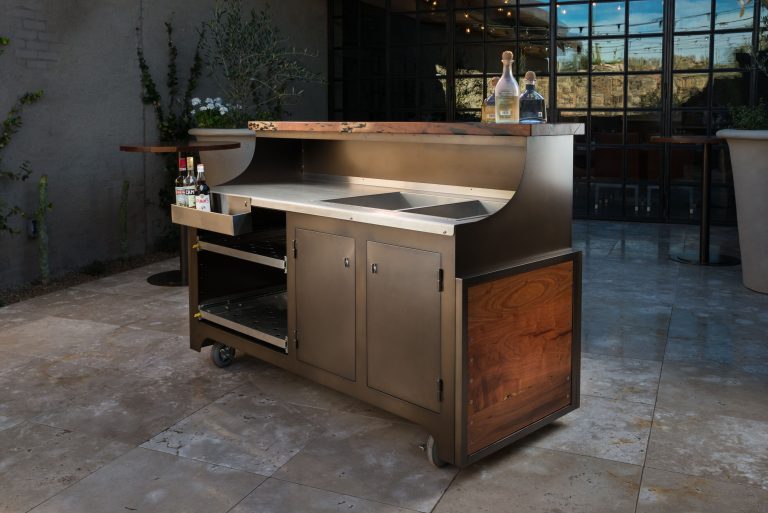5 Mistakes Companies make when ordering custom hospitality and office equipment….
1. Not considering mobility
Nearly every piece of hospitality furniture and equipment is mobile, and most pieces move about on casters. Casters are not a one-size-fits-all proposition. If you rarely move the item you are purchasing you might get away with a small, solid plastic caster; however, if you have a fleet of bar and banquet carts that need to be moved nightly, both indoor and outdoor, then you want a very high-quality pneumatic caster that is probably larger (and more durable) than your current equipment. Yes, it might add some expense, but the ease of movement and durability will more than offset the added expense.
Even if the piece you are buying is not intended to move (perhaps a dining or conference table), you still need to consider the possibilities. From rearranging a dining set-up to consolidating conference rooms, even if you didn’t plan on moving tables, you are likely going to need to at some point. If the tables are too large (or too heavy) to move easily or they require specialty to equipment or dis-assembly/assembly, you are going to incur an unplanned expense at every move. Bottom-line: explain your requirements to your design team. They should offer multiple options to accommodate your needs and explain the advantages (and disadvantages) of each option.
2. Not considering durability
Every hotel and resort has great employees, but let’s face it, they are sometimes in a hurry (or careless) and now you’re repairing a bar, cart or some other expensive piece of equipment. One of the great things about custom equipment the beautiful aesthetics; often much nicer than commercial off-the-shelf pieces, but all too often it’s also too fragile to withstand the rigors of daily commercial use. You shouldn’t have to sacrifice beauty or style for durability.
Custom pieces that are designed for mobility should come standard with quality corner bumpers, powder-coated corner guards and custom covers to protect the piece while in storage and during moves. You should also see if your design team can can make the exterior pieces removable to refresh or even update the piece without having to replace the whole thing (especially corner pieces which are apt to get banged up first). Bottom line: if it’s a commercial piece, it’s going to get beat up over time. Plan up-front to protect your investment and, if possible, make sure it can be repaired or restored to like-new condition for a fraction of the cost of replacing it.
3. Sacrificing functionality and/or appearance
If you’re currently working with a furniture piece (or equipment) you purchased from a catalog, it probably doesn’t work exactly like you want it to. Maybe the banquet bar only has one sink, but you really needed two or the conference table you bought was just the right size, but the wood top is veneer and just doesn’t match the rest of your décor.
If you’re going to spend the money for a custom piece, it should look and function exactly how you want it to. There are myriad of ways to incorporate functionality into just about any piece. If you can’t get a concept drawing from your design team that shows exactly what your piece will look like, and how it will incorporate all of the features you want, it might be time to look around for a new designer. Bottom line: if you are paying for a custom piece – make sure it does everything you want it to do and it looks exactly like you want it.
4. Not considering the time required to produce a custom piece
Contrary to popular belief, it does not always take an exorbitant amount of time to produce a custom piece. (Sometimes it’s even faster than choosing an off-the-shelf piece, especially one that’s not in stock) but there are a few “extra” steps you must consider. If it’s truly a custom piece, it’s not sitting around in a warehouse somewhere – it must be built from scratch and this takes time. There is also the design aspect to consider. Unless you know exactly what you are looking for, this phase may take even longer than the production phase as you work back and forth with your design team to get the concept exactly right.
As long as you have realistic expectations, the timeline is rarely a showstopper. Providing the designer with as much detail as possible up front (to include, photos, sketches and finished samples) will save a huge amount of time in the design phase. Additionally, making quick decisions and proving detailed feedback on the concepts your designer produces will also save copious amounts of time. Bottom line: Let your design team know your timeline requirements up-front, and be ready to make timely decisions in planning, and you shouldn’t have a problem.
5. Not having a realistic budget
Custom pieces are generally more expensive than their mass-produced counterparts, but that doesn’t mean they should be ludicrously expensive. When consideringwhether or not to buy custom, there are a few questions you need to ask:
Do I have a unique size or functional requirement?
Am I trying to match an existing look or achieve a look that I can’t find anywhere else?
Am I just tired of buying subpar equipment every three years?
Am I trying to elevate my customer’s experience?
If the answer to any of the above is yes, you should explore the custom market.
The best thing you can do up-front is to give the design team an idea of what your budget looks like. By providing a ballpark figure, your design team can create realistic concepts and avoid the dreadful sticker shock. A good design team should be able to offer several price points to show you varying levels of fit, finish and functionality to meet your requirements, while also working within the reality of your budget. Bottom line: Custom office furnishings and hospitality equipment are not for everyone. However, for just a little more money and a small investment of time, you can get truly amazing, one-of-a-kind pieces that will elevate your customer’s experience and set your business apart for years to come!
In need of custom hospitality equipment or office furnishings? Have questions? Contact us at 480-344-0111 or visit us online at Yamwood.com





